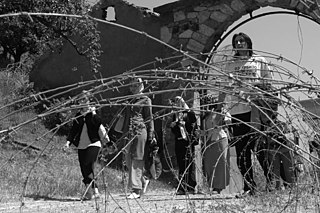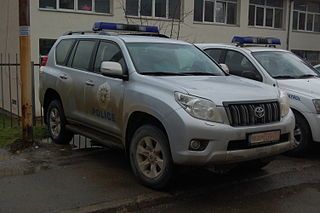
The Kosovo War was an armed conflict in Kosovo that lasted from 28 February 1998 until 11 June 1999. It was fought between the forces of the Federal Republic of Yugoslavia, which controlled Kosovo before the war, and the Kosovo Albanian separatist militia known as the Kosovo Liberation Army (KLA). The conflict ended when the North Atlantic Treaty Organization (NATO) intervened by beginning air strikes in March 1999 which resulted in Yugoslav forces withdrawing from Kosovo.

Kosovo, officially the Republic of Kosovo, is a country in Southeast Europe with partial diplomatic recognition. It is bordered by Albania to the southwest, Montenegro to the west, Serbia to the north and east and North Macedonia to the southeast. It covers an area of 10,887 km2 (4,203 sq mi) and it has a population of approximately 1.6 million. Kosovo has a varied terrain, with high plains along with rolling hills and mountains, some of which reach an altitude of over 2,500 m (8,200 ft). Its climate is mainly continental with some Mediterranean and alpine influences. Kosovo's capital and the most populous city is Pristina; other major cities and urban areas include Prizren, Ferizaj, Gjilan and Peja.

The State Union of Serbia and Montenegro or simply Serbia and Montenegro, known until 2003 as the Federal Republic of Yugoslavia, FR Yugoslavia (FRY) or simply Yugoslavia, was a country in Southeast Europe located in the Balkans that existed from 1992 to 2006, following the breakup of the Socialist Federal Republic of Yugoslavia. The state was founded on 27 April 1992 as a federation comprising the Republic of Serbia and the Republic of Montenegro. In February 2003, it was transformed from a federal republic to a political union until Montenegro seceded from the union in June 2006, leading to the full independence of both Serbia and Montenegro.

The United Nations Interim Administration Mission in Kosovo is the officially mandated mission of the United Nations in Kosovo. The UNMIK describes its mandate as being to "help the United Nations Security Council achieve an overall objective, namely, to ensure conditions for a peaceful and normal life for all inhabitants of Kosovo and advance regional stability in the Western Balkans."

The Kosovo Liberation Army was an ethnic Albanian separatist militia that sought the separation of Kosovo, the vast majority of which is inhabited by Albanians, from the Federal Republic of Yugoslavia (FRY) and Serbia during the 1990s. Albanian nationalism was a central tenet of the KLA and many in its ranks supported the creation of a Greater Albania, which would encompass all Albanians in the Balkans, stressing Albanian culture, ethnicity and nation.

The Yugoslav Wars were a series of separate but related ethnic conflicts, wars of independence, and insurgencies that took place from 1991 to 2001 in what had been the Socialist Federal Republic of Yugoslavia. The conflicts both led up to and resulted from the breakup of Yugoslavia, which began in mid-1991, into six independent countries matching the six entities known as republics that had previously constituted Yugoslavia: Slovenia, Croatia, Bosnia and Herzegovina, Montenegro, Serbia, and Macedonia. SFR Yugoslavia's constituent republics declared independence due to unresolved tensions between ethnic minorities in the new countries, which fueled the wars. While most of the conflicts ended through peace accords that involved full international recognition of new states, they resulted in a massive number of deaths as well as severe economic damage to the region.

The Kosovo Force (KFOR) is a NATO-led international peacekeeping force and military of Kosovo. KFOR is the third security responder, after the Kosovo Police and the EU Rule of Law (EULEX) mission, respectively, with whom we work in close coordination. Its operations are gradually reducing until Kosovo's Security Force, established in 2009, becomes self-sufficient.
The history of Kosovo dates back to pre-historic times when the Starčevo culture, Vinča culture, Bubanj-Hum culture, and Baden culture were active in the region. Since then, many archaeological sites have been discovered due to the abundance of natural resources which gave way to the development of life.
The politics of Kosovo takes place in a framework of a multi-party parliamentary representative democratic republic, whereby the President (Presidenti) is the head of state and the Prime Minister (Kryeministri) the head of government. Parliamentary elections are held every four years, the most recent in 2021.

On 17–18 March 2004, violence erupted in Kosovo, leaving hundreds wounded and at least 19 people dead. The unrest was precipitated by unsubstantiated reports in the Kosovo Albanian media which claimed that three Kosovo Albanian boys had drowned after being chased into the Ibar River by a group of Kosovo Serbs. UN peacekeepers and NATO troops scrambled to contain a gun battle between Serbs and Albanians in the partitioned town of Mitrovica, Kosovo before the violence spread to other parts of Kosovo. Serbs call the event the March Pogrom, while the Albanians call it the March Unrest.
Kosovo during the 20th century in history has largely been characterised by wars and major population displacements. The region formed a part of numerous entities, some internationally recognised, others not.
The political status of Kosovo, also known as the Kosovo question, is the subject of a long-running political and territorial dispute between the Serbian government and the Government of Kosovo, stemming from the breakup of Yugoslavia (1991–92) and the ensuing Kosovo War (1998–99). In 1999, the administration of the Autonomous Province of Kosovo and Metohija was handed on an interim basis to the United Nations under the terms of UNSCR 1244 which ended the Kosovo conflict of that year. That resolution reaffirmed the territorial integrity of Serbia over Kosovo but required the UN administration to promote the establishment of 'substantial autonomy and self-government' for Kosovo pending a 'final settlement' for negotiation between the parties.
The 2008 Kosovo declaration of independence, which proclaimed the Republic of Kosovo to be an independent and sovereign state, was adopted at a meeting held on 17 February 2008 by 109 out of the 120 members of the Assembly of Kosovo, including the Prime Minister of Kosovo, Hashim Thaçi, and by the President of Kosovo, Fatmir Sejdiu. It was the second declaration of independence by Kosovo's Albanian-majority political institutions; the first was proclaimed on 7 September 1990.

The Autonomous Province of Kosovo and Metohija, commonly known as Kosovo and abbreviated to Kosmet or KiM, is an autonomous province that occupies the southernmost corner of Serbia, as defined by the country's constitution. The territory is the subject of an ongoing political and territorial dispute between the Republic of Serbia and the partially recognised Republic of Kosovo, with the APKM being viewed as the de jure interpretation of the territory under Serbian law; however, the Serbian government currently does not control the territories because they are de facto administered by the Republic of Kosovo. Its claimed administrative capital and largest city is Pristina.

Numerous war crimes were committed by all sides during the Kosovo War, which lasted from 28 February 1998 until 11 June 1999. According to Human Rights Watch, the vast majority of abuses were attributable to the government of Slobodan Milošević, mainly perpetrated by the Serbian police, the Yugoslav army, and Serb paramilitary units. During the war, regime forces killed between 7,000–9,000 Kosovar Albanians, engaged in countless acts of rape, destroyed entire villages, and displaced nearly one million people. The Kosovo Liberation Army has also been implicated in atrocities, such as kidnappings and summary executions of civilians. Moreover, the NATO bombing campaign has been harshly criticized by human rights organizations and the Serbian government for causing roughly 500 civilian casualties.

The colonization of Kosovo was a programme begun by the kingdoms of Montenegro and Serbia in the early twentieth century and later implemented by their successor state Yugoslavia at certain periods of time from the interwar era (1918–1941) until 1999. Over the course of the twentieth century, Kosovo experienced four major colonisation campaigns that aimed at altering the ethnic population balance in the region, to decrease the Albanian population and replace them with Montenegrins and Serbs. Albanians formed the ethnic majority in the region when it became part of Yugoslavia in early twentieth century.

Serbia, as a constituent subject of the SFR Yugoslavia and later the FR Yugoslavia, was involved in the Yugoslav Wars, which took place between 1991 and 1999—the war in Slovenia, the Croatian War of Independence, the Bosnian War, and Kosovo. From 1991 to 1997, Slobodan Milošević was the President of Serbia. The International Criminal Tribunal for the former Yugoslavia (ICTY) has established that Milošević was in control of Serb forces in Bosnia and Herzegovina and Croatia during the wars which were fought there from 1991 to 1995.

Kosovo within communist Yugoslavia had the lowest rate of crime in the whole country. Following the Kosovo War (1999), the region had become a significant center of organized crime, drug trafficking, human trafficking and organ theft. There is also an ongoing ethnic conflict between Kosovar Albanians and Kosovan Serbs. The large Kosovar diaspora which had built up in Western Europe during the 1990s, combined with the political instability, created ideal conditions for Kosovo to become "Europe's crime hub"; well into the 2000s, Kosovo remained associated with both ethnic conflict and organized crime. A Kosovo Police service has been built up under UN administration, beginning in 1999. It had an operational force of 7,000 officers in 2004, and further expanded to 9,000 by 2010. The deplorable crime rate led to an additional deployment of civilian law enforcement resources of the European Union to Kosovo, under the name of European Union Rule of Law Mission in Kosovo in 2008. Originally scheduled for two years, the duration of the deployment was extended twice, as of September 2012 scheduled to last until 2014.

The Insurgency in Kosovo began in 1995, following the Dayton Agreement that ended the Bosnian War. In 1996, the Kosovo Liberation Army (KLA) began attacking Serbian governmental buildings and police stations. This insurgency would lead to the more intense Kosovo War in February 1998.

The architectural heritage of the Kosovo Albanians during Yugoslav rule was shown institutionalised disregard for decades prior to outright conflict at the end of the 20th century. Numerous Albanian cultural sites in Kosovo were destroyed during the period of Yugoslav rule and especially the Kosovo conflict (1998-1999) which constituted a war crime violating the Hague and Geneva Conventions. In all, 225 out of 600 mosques in Kosovo were damaged, vandalised, or destroyed alongside other Islamic architecture during the conflict. Additionally 500 Albanian owned kulla dwellings and three out of four well-preserved Ottoman period urban centres located in Kosovo cities were badly damaged resulting in great loss of traditional architecture. Kosovo's public libraries, of which 65 out of 183 were completely destroyed, amounted to a loss of 900,588 volumes, while Islamic libraries sustained damage or destruction resulting in the loss of rare books, manuscripts and other collections of literature. Archives belonging to the Islamic Community of Kosovo, records spanning 500 years, were also destroyed. During the war, Islamic architectural heritage posed for Yugoslav Serb paramilitary and military forces as Albanian patrimony with destruction of non-Serbian architectural heritage being a methodical and planned component of ethnic cleansing in Kosovo.















